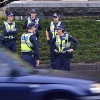683 careers found.
Pharmacologists evaluate the origin, effects and mechanisms of drugs and develop them for human and animal use.
Photographers operate cameras and lighting equipment to take photographs of people, places, products and other subjects. Areas of specialisation in photography include photojournalism, fashion, food, scientific, commercial, industrial, medical, portrait, wedding, advertising, landscape, art and architectural.
Physical science technical officers support scientists in the physical sciences. They perform laboratory tests on solids, liquids and gases, analyse test data and carry out a range of technical functions. Work in physical science areas such as physics, chemistry, biotechnology and engineering is usually undertaken in support of other scientists.
Physicists study the behaviour of the physical world at the most basic level and find practical ways to apply new knowledge gained from their research in areas of science and technology.Physicists are usually identified within three broad roles:• theoretical physicists, who develop theories or models of how particular aspects of the world work• experimental physicists, who test these theories, determining their limits and suggesting new approaches to them• applied physicists, who apply these findings in practical settings, such as within industry and through the introduction of new technology.There is interaction between all three roles and physicists generally have skills in each of these areas.
Physiotherapists assess, treat and prevent disorders in human movement caused by injury and disease. Further into their career, physiotherapists can choose to practise in specific areas such as muscle and skeletal conditions, women's health, aged care, chest conditions, occupational health and safety, sports injuries, babies and young children, problems of the nervous system and spinal injuries, administration, education or research.
Picture framers make frames of all types and sizes and mount and display decorative items such as paintings, prints, etchings, tapestries and photographs.
Pilots fly various types of aircraft, including light planes, helicopters or airline aircraft, depending on the aircraft type they are approved to fly. They may transport passengers, mail and freight within Australia, internationally on scheduled airline and unscheduled charter services, or provide other aviation services as required.
Plastics and composites processors handle machinery that manufactures or finishes plastic or composite products by injection moulding, extrusion, blow moulding, blow film extrusion and other processes.
Platform engineering is a critical role in the tech industry that involves designing, building and maintaining the infrastructure that powers modern digital services. A platform engineer is responsible for creating and supporting the underlying systems that allow software applications to run smoothly and efficiently. In Australia, the demand for platform engineers is growing as more and more businesses embrace digital transformation.
Plumbers lay out, install, test and maintain pipes, fixtures, metal roofing, fittings, gas meters and regulators.
Employers & associations:
Australian Apprenticeships and Traineeships Information Service (AATIS)
Podiatrists look after the health of people's feet by diagnosing, treating and preventing foot abnormalities, and educating the public about good foot health. Podiatrists may develop a special interest in dealing with particular client groups, such as children, the aged or sportspeople. They may also work in a particular area, such as occupational health, or with general medical conditions that result in foot and leg problems.
Police officers working for the Australian Federal Police (AFP) are responsible for policing federal law in all states and territories, and for community policing in the ACT and Australia's external territories. The AFP, with its headquarters located in Canberra, is Australia's international law enforcement and policing agency. It is the chief source of advice to the Australian Government on policing issues, enforces Commonwealth criminal law and protects Commonwealth and national interests.
Police officers protect the community from crime and disorder by providing services to uphold the law, protect life and property, preserve the peace, prevent crime, detect and apprehend offenders, and help those in need of assistance.
Policy analysts develop and advise on policies that guide the design, implementation and modification of government and commercial operations and programs.
Policy and planning managers direct the development of policy advice and strategic planning within government agencies, community not-for-profit organisations and other companies.






